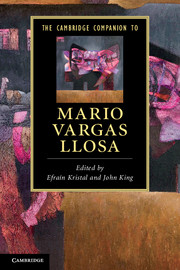Book contents
- Frontmatter
- Introduction
- 1 Reality and rebellion: An overview of Mario Vargas Llosa’s literary themes
- 2 The early novels: The Time of the Hero and The Green House
- 3 The total novel and the novella: Conversation in The Cathedral and The Cubs
- 4 Humour and irony: Captain Pantoja and the Special Service and Aunt Julia and the Scriptwriter
- 5 The historical novel: The War of the End of the World
- 6 Innocence and corruption: Who Killed Palomino Molero? and The Storyteller
- 7 The political novels: The Real Life of Alejandro Mayta and Death in the Andes
- 8 The erotic novels: In Praise of the Stepmother and The Notebooks of Don Rigoberto
- 9 The dictator novel: The Feast of the Goat
- 10 From utopia to reconciliation: The Way to Paradise, The Bad Girl and The Dream of the Celt
- 11 The essays
- 12 The memoir: A Fish in the Water
- 13 The plays
- 14 Film and the novels
- 15 An interview
- Further reading
- General index
- Index of selected fictional characters
- Index of selected works by Vargas Llosa
12 - The memoir: A Fish in the Water
Published online by Cambridge University Press: 28 January 2012
- Frontmatter
- Introduction
- 1 Reality and rebellion: An overview of Mario Vargas Llosa’s literary themes
- 2 The early novels: The Time of the Hero and The Green House
- 3 The total novel and the novella: Conversation in The Cathedral and The Cubs
- 4 Humour and irony: Captain Pantoja and the Special Service and Aunt Julia and the Scriptwriter
- 5 The historical novel: The War of the End of the World
- 6 Innocence and corruption: Who Killed Palomino Molero? and The Storyteller
- 7 The political novels: The Real Life of Alejandro Mayta and Death in the Andes
- 8 The erotic novels: In Praise of the Stepmother and The Notebooks of Don Rigoberto
- 9 The dictator novel: The Feast of the Goat
- 10 From utopia to reconciliation: The Way to Paradise, The Bad Girl and The Dream of the Celt
- 11 The essays
- 12 The memoir: A Fish in the Water
- 13 The plays
- 14 Film and the novels
- 15 An interview
- Further reading
- General index
- Index of selected fictional characters
- Index of selected works by Vargas Llosa
Summary
The drafts of A Fish in the Water (El pez en el agua) in the Mario Vargas Llosa Papers at Princeton University Library bear witness to a creative, literary process in the work of autobiography: organising a life into language and genre. The preliminary drafts catalogued as ‘First Draft Version A’ and ‘First Draft Version B’ (over 200 pages each) closely follow Vargas Llosa's run for the Peruvian presidency, which he lost to Alberto Fujimori in 1990. Between his ‘Second Draft’, with the indication that it was completed in November 1991, during his residency at an institute for advanced studies in Berlin, and the completed book, with the indication that it was completed at Princeton in February 1993, he had composed at least four other drafts. The final version alternates between two kinds of chapters. The even chapters, closely related to the content of original drafts, amount to a political memoir of his failed political campaign. The odd chapters are a coming-of-age autobiography that chronicles Vargas Llosa's formative years, while the political chapters shed light on the private story of an individual who became a political figure. The coming-of-age narrative evokes aspects of the Bildungsroman. The pattern of alternating chapters resembles Vargas Llosa's most recurrent literary technique from Aunt Julia and the Scriptwriter (La tía Julia y el escribidor, 1977) until The Dream of the Celt (El sueño del celta, 2010), in which he alternates narratives that correspond to different periods in the lives of his characters, or to different literary registers. In short, there was a considerable amount of literary thinking brought to bear in the gestation of this book.
- Type
- Chapter
- Information
- The Cambridge Companion to Mario Vargas Llosa , pp. 174 - 184Publisher: Cambridge University PressPrint publication year: 2011



